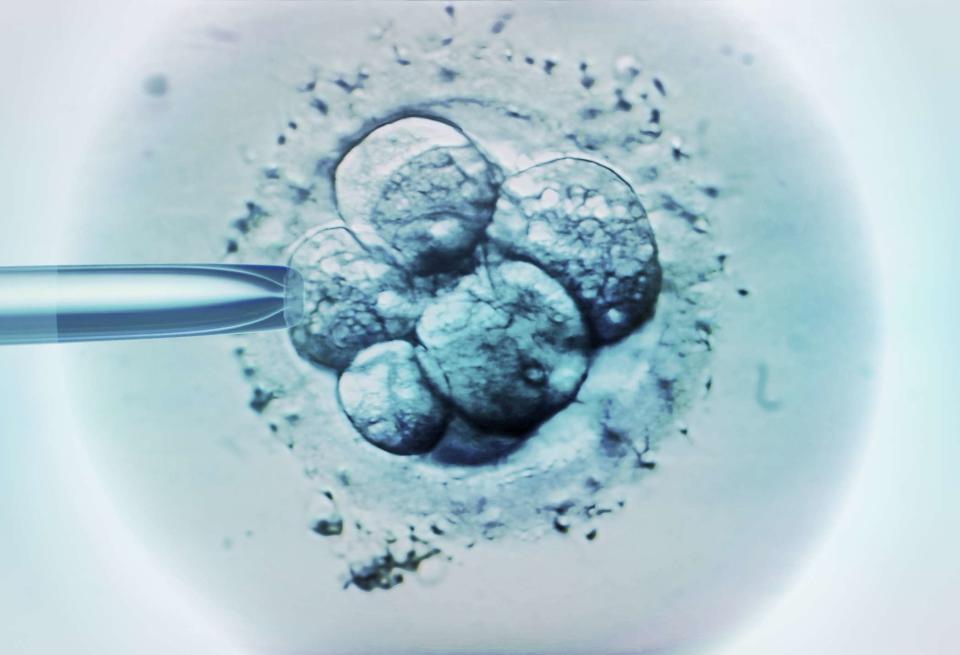What Is Multifetal Reduction—and Should I Consider It?
The decision to undergo multifetal reduction is both personal and complex. Here, several experts explain the benefits and risks.

Getty Images
Since the emergence of IVF and fertility treatments that induce ovulation, many individuals have found themselves pregnant with multiples. Pregnancies with three or more fetuses can be significantly more dangerous for parents and their unborn children than pregnancies with one or two fetuses. As such, many may find themselves considering multifetal reduction, a procedure that removes one or more embryos.
Related:
The decision about whether to undergo multifetal reduction is deeply personal and complex. Here, maternal-fetal medicine specialists help us understand what the procedure is for, how it's done, and how to find the support you need to make the best decision for you and your family.
What Is Multifetal Reduction?
According to the American College of Obstetricians and Gynecologists (ACOG), multifetal reduction is a procedure usually done in the first trimester, or beginning of the second. In the vast majority of cases, multifetal reduction is only done when a person is pregnant with three or more embryos, and the goal of the procedure is to reduce the number of embryos—by one or more.
ACOG ties the emergence of multifetal reduction with the proliferation of assisted reproductive technologies like IVF and ovulation hyperstimulation, where parents are given medications such as clomid to induce ovulation. Both of these procedures carry the risk of pregnancies with multiple embryos.
For example, between 1980 and 1998, when assisted reproductive technology was at its peak, the rate of higher-order births (birth with 3 or more embryos) increased over 400%. Thankfully, medicine has fine-tuned these procedures and doctors are now better able to control the number of viable embryos that result. Still, multiples are more common when you use assisted reproductive technology to get pregnant.
Why Is Multifetal Reduction Done?
Multifetal reduction is done because of the dangers that carrying multiple fetuses involves, explains Julia Bregand-White, MD, OB-GYN and maternal-fetal medicine specialist at UCI Health Maternal Fetal Medicine. "Because multifetal gestations carry higher risks of complications, a reduction procedure can help reduce that risk, whether or not the current pregnancy has any specific complications other than a multifetal gestation itself," Dr. White explains.
What Are the Benefits of Multifetal Reduction?
Because multifetal reduction reduces the number of fetuses one is carrying, there are numerous benefits to both the pregnant person and their unborn baby/babies. Some risks of multiple pregnancies include hypertension, gestational diabetes, and peripartum hemorrhage. Birth trauma is also possible, and according to Dr. Bregand-White, there are risks to the other fetuses too. Prematurity, learning disabilities, developmental delays, cerebral palsy, chronic lung disease, and death are all possible.
But the benefits aren't just medical: they are emotional, social, and financial. "Due to the short- and long-term implications of these complications, reducing a multifetal gestation can have a tremendous impact on the families, not to mention the emotional and financial burden of parenting multiples," Dr. Bregand-White explains.
Kecia Gaither, MD, MPH, a double board-certified in OB/GYN and maternal fetal medicine, agrees with this sentiment, and emphasizes the economic strain that can result from birthing higher order multiples. "There are the economic/health costs relegated to the care of multiples—childcare, education, medical expenses, loss of work availability for the parents," she says. "Stress and compromised quality of life is increased."
Another aspect to keep in mind, says Dr. Gaither, is that sometimes in a multiple order pregnancy, there will be non-viable fetuses, along with healthy fetuses. Often, the non-viable fetus needs to be removed in order to keep the normal fetus healthy. Dr. Gaither also adds that sometimes the pregnant person's life may be in danger if a higher-order multifetal pregnancy continues. Maternal death is a real danger in pregnancies of three or more fetuses.
How Is the Procedure Performed?
Multifetal reductions are done carefully and methodically by highly trained professionals, such as OB-GYNs or maternal fetal specialists. Your physician will prepare you beforehand for the procedure so you know what to expect. "The procedure is done under sterile conditions and with ultrasound guidance," Dr. Gaither describes.
There are several different methods used to perform multifetal reductions, says Dr. Bregand-White. "Using ultrasound guidance, either a medication to stop the heartbeat can be placed into the fetus to be reduced, or a procedure to stop the blood flow within the umbilical cord of a fetus to be reduced can be performed," she describes. Both procedures will ensure that your other fetuses are not harmed, she assures.
Are There Any Risks?
Multifetal reduction is considered a low risk procedure. However, there are some possible risks. These include miscarriage, infection, and preterm delivery, says Dr. Gaither. You may also bleed after the procedure, says Dr. Bregand-White. If you have any questions about your risk profile, or about any symptoms you are experiencing after the procedure, please reach out to your physician.
Making The Decision
When it comes to deciding whether or not to do a multifetal reduction, it's important to understand that there is no one right answer. It's a private and extremely personal decision. It's also vital to remember that, if you go through with the procedure, all of your feelings are normal and okay, whether you are feeling relief, fear, grief, contentment—or a combination of these feelings.
"Any time a family is expecting a multifetal gestation, the counseling regarding risks must be clear but also sensitive to the fact that, while the option of reduction can significantly reduce these serious risks, it carries a heavy emotional burden," Dr. Bregand-White says. Additionally, there are complex ethical considerations that parents must sort through, she says.
Related:
Dr. Bregand-White emphasizes that you don't have to make this decision alone. "A maternal fetal medicine specialist is especially trained to help families navigate these difficult decisions," she offers. "It is imperative that families feel they are receiving unbiased counseling and often benefit from the multidisciplinary expertise of neonatologists, child development specialists, and support groups."

